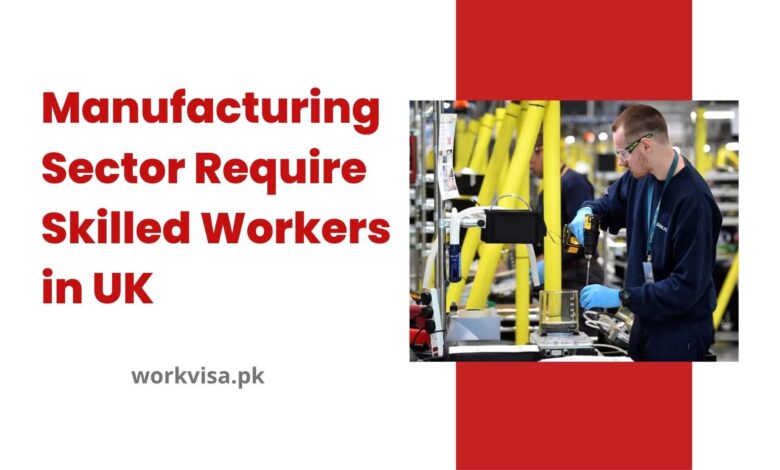Manufacturing Sector Require Skilled Workers in UK 2025

The UK manufacturing industry, a cornerstone of the national economy, is facing a severe skills shortage. According to a report by Make UK, nearly 36% of job vacancies in the sector remain unfilled due to a lack of qualified candidates.
This workforce crisis presents significant opportunities for professionals across various disciplines, including engineering, IT, and advanced manufacturing.
Check Also: UK Work Visa Options – No Job Offer
The Urgency of Skilled Labor in UK Manufacturing:
The UK manufacturing sector is undergoing rapid technological advancements, including automation, digitalization, and artificial intelligence. However, the industry struggles to find skilled workers who can operate and manage these cutting-edge technologies. Make UK warns that without immediate action, the manufacturing skills gap could cost the economy billions in lost productivity.
According to a government announcement, over £4.5 billion is being invested in key manufacturing sectors to drive innovation and secure long-term economic growth (UK Government).
Manufacturing Sectors with High Demand for Skilled Workers:
The UK government has identified five priority sectors requiring urgent skilled labor:
- Automotive Manufacturing – Driven by a £2 billion investment in zero-emission vehicle production.
- Aerospace – Supported by £975 million for energy-efficient technologies.
- Clean Energy – Backed by £960 million for renewable equipment production.
- Life Sciences – Receiving £520 million to enhance biotechnology and pharmaceutical capabilities.
- Advanced Manufacturing – Focused on integrating digitalization and automation to increase efficiency.
High-Demand Manufacturing Occupations in UK:
Workers with expertise in the following roles are in high demand:
- Mechanical and Electrical Engineers
- Skilled Tradespeople (Welders, Machinists, Electricians)
- IT Specialists (Cybersecurity, Software Development, Automation)
- Production Managers (Overseeing manufacturing processes)
- R&D Scientists (Innovation in product development and manufacturing)
- Quality Assurance Specialists
- Supply Chain Managers
Average Salaries:
| Occupation | Salary Range (£ per year) |
|---|---|
| Mechanical Engineer | 35,000–55,000 |
| Welder | 25,000–40,000 |
| Production Manager | 45,000–70,000 |
| IT Specialist | 50,000–80,000 |
| R&D Scientist | 40,000–60,000 |
Why Consider a Career in UK Manufacturing?
- Competitive Salaries – Wages in manufacturing often exceed national averages due to high demand for technical skills.
- Job Stability – The manufacturing sector remains a key pillar of the UK economy, offering long-term employment opportunities.
- Career Growth – Training programs and professional development opportunities allow for career progression.
- Innovation & Technology – Workers have access to cutting-edge machinery and digital advancements.
- Government Support – Initiatives like Made Smarter promote digital transformation and upskilling within the industry.
How to Qualify and Apply for a Skilled Worker Visa?
Foreign professionals looking to enter the UK manufacturing workforce must apply for a Skilled Worker Visa.
Key Requirements:
- The job must be listed as an eligible occupation (Check the full list here).
- The offered salary must meet the minimum threshold of £26,200 per year or £10.75 per hour (depending on role and experience).
- English language proficiency is required.
- Applicants must receive a confirmed job offer from a UK employer licensed to sponsor visas.
Application Process:
- Find a Job – Use platforms like LinkedIn, Reed, Totaljobs, and the UK Government Job Portal.
- Prepare Your Resume – Tailor it to UK job market expectations.
- Apply for a Skilled Worker Visa (Official Application Portal).
- Secure Relocation & Housing – Research living costs in major UK cities.
Conclusion:
The UK manufacturing sector is at a turning point. With major government investments and an increasing demand for skilled professionals, now is the perfect time for job seekers to explore opportunities in this evolving industry. Whether you are an engineer, IT specialist, or tradesperson, your expertise is needed to drive the future of UK manufacturing.
Frequently Asked Questions:
-
What skilled jobs are in demand in the UK?
Programmers and software development professionals are the largest occupation, with 561k workers, followed by secondary education teaching professionals with 444k workers. The health and social care industry employs the largest number of workers in occupations with either critical or elevated demand.
-
Why has the UK’s manufacturing sector declined?
A lack of market optimism, slower economic growth, stretched supply chains, and concerns about the impacts of possible announcements in the UK budget (which were unknown at the time of the survey) led to reduced intakes of new work and a near-stalling of output growth,” S&P Global commented.
-
Who qualifies as a skilled worker in the UK?
Anyone working in an eligible occupation code at RQF level 3 or higher qualifies as a skilled worker in the UK. This is the equivalent of a UK A-level school qualification. The job must also have a standard occupation code (SOC) that is included in the list of eligible occupations for the Skilled Worker visa.




